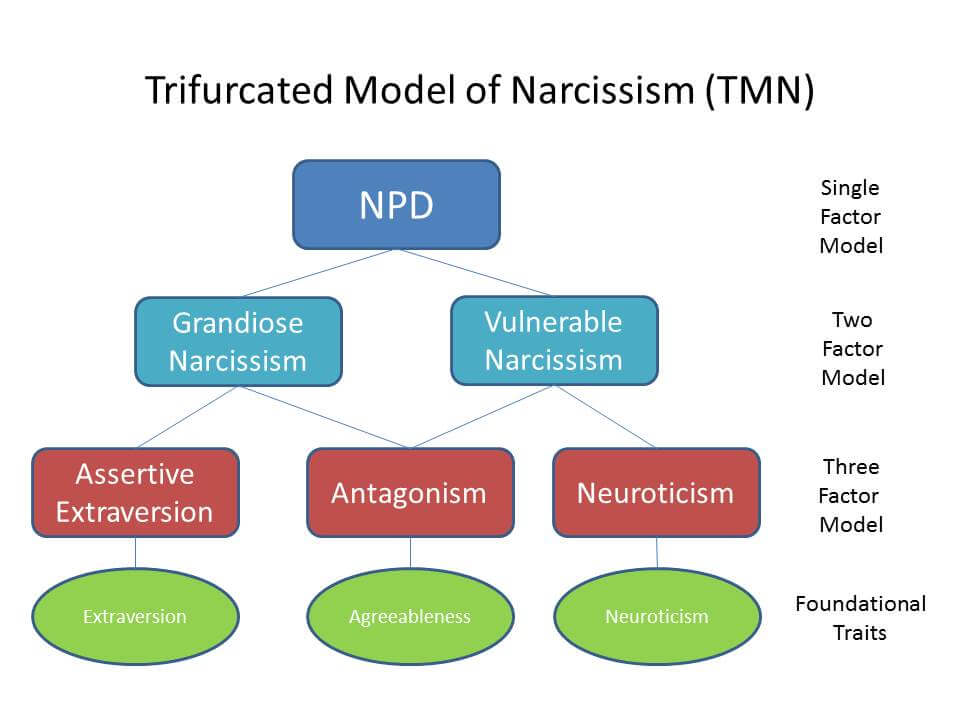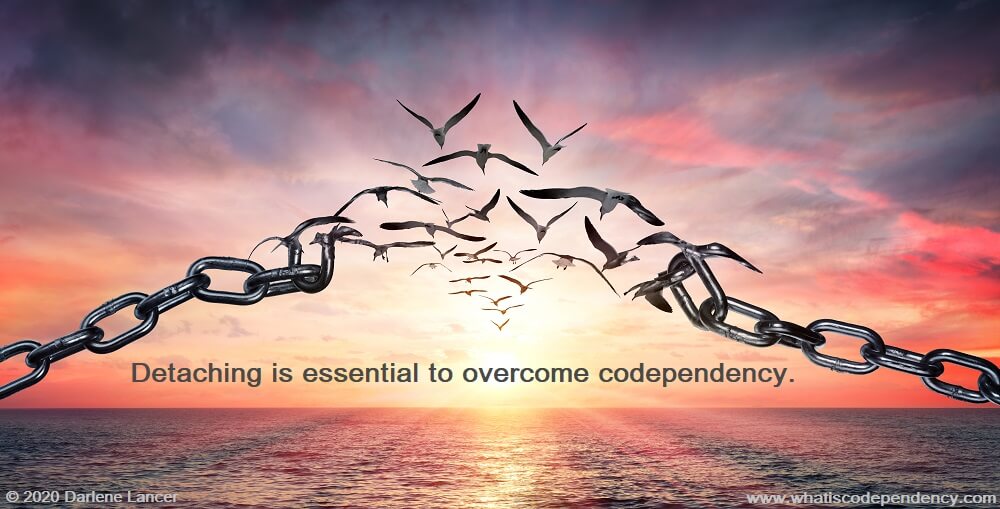Each month I post a new article. You can search for blog topics using the search form in the menu at the top of the page or see a list of titles. To timely receive each new monthly article, subscribe to my blog by joining my annual mailing list at the bottom of this page. To only receive each monthly article, subscribe at the end of any blog post or use the “Subscribe to My Blog” link in the footer of any page.
Do share articles with your friends and post them on social media. Contact me for permission to copy (other than for personal use), distribute or publish any article.
I welcome comments, but please observe the word limit to permit room for all. Use your correct email address to prevent spam (it won’t be public); otherwise, your comment won’t be published. You’ll be added to my annual mailing list. For more information on commenting, see our Terms of Use.
I’m unable to provide feedback of a personal nature without knowing more about you. For individual advice, professional counseling or coaching is appropriate. See Services regarding an appointment.
The Promises of Recovery
 Recovery is a transformational journey called individuation. The promises of recovery and the benefits it returns are freedom, confidence, and self-love. There are stages of recovery from addiction and codependency, from building awareness and detaching, doing the hard work of changing yourself and your life, to eventually experiencing the promises.
Recovery is a transformational journey called individuation. The promises of recovery and the benefits it returns are freedom, confidence, and self-love. There are stages of recovery from addiction and codependency, from building awareness and detaching, doing the hard work of changing yourself and your life, to eventually experiencing the promises.
It’s common for people to complain that their partner or loved ones aren’t working on themselves. They think, “Why bother?” This attitude is ill-conceived, because we embark on this journey to change ourselves, and we are the ones who reap the rewards.
What is Narcissistic Abuse?
 Narcissists don’t really love themselves. Actually, they’re driven by shame. It’s the idealized image of themselves, which they convince themselves they embody, that they admire. But deep down, narcissists feel the gap between the façade they show the world and their shame-based self. They work hard to avoid feeling that shame. This gap is true for other codependents, as well, but a narcissist uses destructive defense mechanisms that damage relationships and their loved ones’ self-esteem.
Narcissists don’t really love themselves. Actually, they’re driven by shame. It’s the idealized image of themselves, which they convince themselves they embody, that they admire. But deep down, narcissists feel the gap between the façade they show the world and their shame-based self. They work hard to avoid feeling that shame. This gap is true for other codependents, as well, but a narcissist uses destructive defense mechanisms that damage relationships and their loved ones’ self-esteem.
What Is a Trauma Bond?
 A trauma bond is an attachment to an abuser in a relationship with a cyclical pattern of abuse. Patrick Carnes, Ph.D., coined the term in 1997. He defined it as an adaptive, dysfunctional attachment occurring in the presence of danger, shame, or exploitation in order to survive. It is a trauma reaction created due to a power imbalance and recurring abuse mixed with intermittent positive reinforcement; in other words, good and bad treatment. The abuser is the dominant partner who controls the victim with fear, unpredictability, belittling, and control.
A trauma bond is an attachment to an abuser in a relationship with a cyclical pattern of abuse. Patrick Carnes, Ph.D., coined the term in 1997. He defined it as an adaptive, dysfunctional attachment occurring in the presence of danger, shame, or exploitation in order to survive. It is a trauma reaction created due to a power imbalance and recurring abuse mixed with intermittent positive reinforcement; in other words, good and bad treatment. The abuser is the dominant partner who controls the victim with fear, unpredictability, belittling, and control.
Having a Narcissistic Parent
 A narcissistic parent behaves as they imagine themselves to be—the king or queen of the family, or someone whose activities are more important than being part of the family. As a child, your parents are your world until you’re able to leave home. Your survival and self-concept depend on them. A narcissistic parent can severely damage your self-esteem, which to develop requires love and acceptance from both parents. Children of narcissistic parents typically grow up insecure and codependent.Continue reading
A narcissistic parent behaves as they imagine themselves to be—the king or queen of the family, or someone whose activities are more important than being part of the family. As a child, your parents are your world until you’re able to leave home. Your survival and self-concept depend on them. A narcissistic parent can severely damage your self-esteem, which to develop requires love and acceptance from both parents. Children of narcissistic parents typically grow up insecure and codependent.Continue reading
Narcissists’ Dirty Little Secret
 You won’t guess abusers’ dirty little secret – the one thing narcissists and abusers don’t want you to know. In fact, they find it so shameful that most of them won’t admit it even to themselves. They hide it behind their abuse and bluster, their braggadocio, and their arrogance.
You won’t guess abusers’ dirty little secret – the one thing narcissists and abusers don’t want you to know. In fact, they find it so shameful that most of them won’t admit it even to themselves. They hide it behind their abuse and bluster, their braggadocio, and their arrogance.
People are fooled by the narcissist’s bold persona. They’re confused by their words and intimidated and shamed by their aggression. They don’t realize that an abuser’s personality is a mask and that their behavior is a smoke and mirror game. It’s manufactured as a defense system to hide a scared, insecure child inside – a child who feels as insignificant as the abuser’s pretense of importance.
Their secret is that they feel insecure and needy. This is why they must at all costs feel powerful and in control. Once you realize this, it explains their entire personality and abuse. They act as if they’re needless and judge their partners for their needs and feelings. Some abusers and narcissists seem quite self-sufficient outside of an intimate relationship.
Are You Feeding Narcissistic Supply?
 Narcissists hunger to have their needs for power, admiration, and attention filled is constant and relentless. They require continuous validation and praise but don’t hope for the same in return. If you’re in a close relationship with a narcissist, they expect you to supply them.
Narcissists hunger to have their needs for power, admiration, and attention filled is constant and relentless. They require continuous validation and praise but don’t hope for the same in return. If you’re in a close relationship with a narcissist, they expect you to supply them.
The term “narcissistic supply” is based on the psychoanalytic theory that concerns essential needs of babies and toddlers to maintain their mental and emotional equilibrium. Loss of necessary supplies in childhood can lead to depression and later attempts to get them through addiction and other means.
Narcissists’ deficient self and inner resources make them dependent on other people to affirm their impaired self-esteem and fragile ego. They only validate themselves as reflected in the eyes of others.
Despite their facade of confidence, boasting, and self-flattery, they crave attention, respect, and constant admiration and actually fear that they’re undesirable.
Continue reading
How to Have Boundaries in the Pandemic
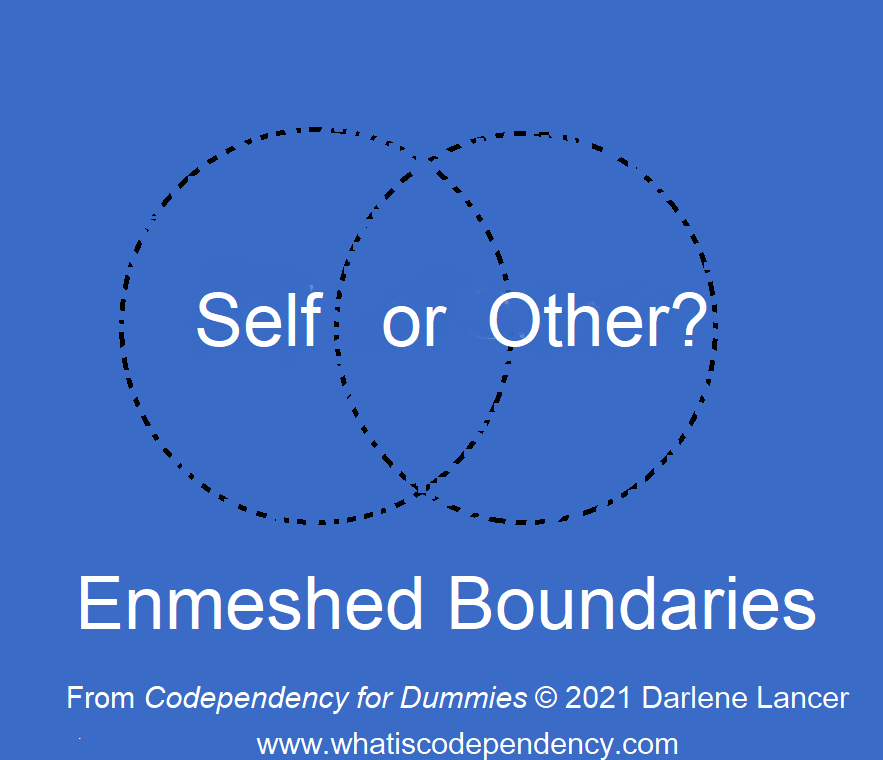 Maintaining boundaries is challenging for most of us. But the pandemic has made it even more difficult. People have been quarantined with a partner, housemate, or family for nearly a year. Normally, we could create physical space by seeing friends, going to work, the gym, or even taking side trips.
Maintaining boundaries is challenging for most of us. But the pandemic has made it even more difficult. People have been quarantined with a partner, housemate, or family for nearly a year. Normally, we could create physical space by seeing friends, going to work, the gym, or even taking side trips.
All that has changed. People who have been alone and lonely realize how much they need others. Some couples are closer, while others are headed for divorce.
Drug and alcohol abuse has risen, as well as mental health issues, such as anxiety and depression. A recent UK study reveals some interesting statistics:
Why Receiving is Hard
Is receiving a compliment or a gift difficult for you? Do you ever ask for a favor or help, or would you rather do it yourself? These are just small examples of why you may not be getting the love you want in a relationship. In healthy relationships, there is a daily exchange of love, help, and cooperation. Continue reading
Narcissists’ Tactics to Gain Power and Self-Esteem
 To some degree, we all desire to improve our social status and self-esteem, but narcissists feel compelled to. A recent study concluded this is their constant concern. More than most people, they look to others for self-definition and self-esteem, which is very high or low. Continue reading
To some degree, we all desire to improve our social status and self-esteem, but narcissists feel compelled to. A recent study concluded this is their constant concern. More than most people, they look to others for self-definition and self-esteem, which is very high or low. Continue reading
Healing Psychic Wounds of Codependency
 Codependency is more than a relationship problem. Wounds of codependency affect our psyche and individual development. Make no mistake. It’s to no fault of our own. Codependency is adaptive and helped us survive growing up in a dysfunctional family system. But that adjustment cost us our individuality, authenticity, and our future quality of life. The beliefs and behaviors we learned led to problems in adult relationships. In fact, they tend to recreate the dysfunctional family of our past. Continue reading
Codependency is more than a relationship problem. Wounds of codependency affect our psyche and individual development. Make no mistake. It’s to no fault of our own. Codependency is adaptive and helped us survive growing up in a dysfunctional family system. But that adjustment cost us our individuality, authenticity, and our future quality of life. The beliefs and behaviors we learned led to problems in adult relationships. In fact, they tend to recreate the dysfunctional family of our past. Continue reading
4 Types of Narcissism Share a Core Trait
There are four major types of narcissism. Researchers have been hunting for the core of narcissism that all narcissists share despite varying symptoms and severity. Narcissists use a variety of tactics and defenses to keep you insecure and ensure their status and their needs are met. It’s easy to be confused, but it’s important to understand and spot which type of narcissist you’re dealing with. Recently, two research teams have identified a common trait.
Dating a Narcissist
 You won’t realize you’re dating a narcissist. Narcissists are exceedingly skilled at making you like them. They can be alluring, charming, and exciting to date. In fact, in one study, it took seven meetings for people to see through their likable veneer. When dating, a narcissist has a greater incentive to win you over—sadly, sometimes all the way to the altar. Narcissists are never boring. Continue reading
You won’t realize you’re dating a narcissist. Narcissists are exceedingly skilled at making you like them. They can be alluring, charming, and exciting to date. In fact, in one study, it took seven meetings for people to see through their likable veneer. When dating, a narcissist has a greater incentive to win you over—sadly, sometimes all the way to the altar. Narcissists are never boring. Continue reading
How to Tell if You’re Willful or Strong Willed
 Strong-willed people are successful, yet those who are willful often sabotage success. Willful individuals can be fiercely stubborn in their opinions and pursuit of their goals, ignoring what other people think and need. They often fiercely force their will despite obstacles or negative implications. Their behavior has obsessive and compulsive qualities in that they’re unable to let go and is an obstacle to overcoming codependency and addiction. Continue reading
Strong-willed people are successful, yet those who are willful often sabotage success. Willful individuals can be fiercely stubborn in their opinions and pursuit of their goals, ignoring what other people think and need. They often fiercely force their will despite obstacles or negative implications. Their behavior has obsessive and compulsive qualities in that they’re unable to let go and is an obstacle to overcoming codependency and addiction. Continue reading
Changing Codependent Dynamics in Abusive Relationships
 If you’re in an abusive relationship, you may not realize that your behavior encourages the relationship’s unhealthy dynamics. Often codependents are in abusive relationships with addicts or people who have mental illness. From my personal and professional experience, it’s hard – nearly impossible – to change the dynamics in abusive relationships without support, particularly in a long-term relationship. Continue reading
If you’re in an abusive relationship, you may not realize that your behavior encourages the relationship’s unhealthy dynamics. Often codependents are in abusive relationships with addicts or people who have mental illness. From my personal and professional experience, it’s hard – nearly impossible – to change the dynamics in abusive relationships without support, particularly in a long-term relationship. Continue reading
How to Detach and Let Go with Love
Although it’s painful to see our loved ones be self-destructive, detaching allows us to enjoy our lives despite another person’s problems and behavior. Attachment and caring are normal. It’s healthy to get attached to people we love and care about, but codependent attachment causes us pain and problems in relationships. We become overly attached—not because we love so much but because we need so much. Continue reading
7 Ways of Cultivating Love in Your Life
 Most of us seek someone to love or to love us. We don’t think about cultivating self-love or realize that love originates within. You may be seeking a relationship, but research suggests that singles are actually happier than married people, with the exception of happily married people. But even that dwindles over time. A new study shows that on average, after the first year, spouses return to their baseline state of happiness prior to the marriage. Thus, similar to the conclusions reached in the studies done on lottery winners, after marriage and after winning, we eventually return to how happy we are as individuals.
Most of us seek someone to love or to love us. We don’t think about cultivating self-love or realize that love originates within. You may be seeking a relationship, but research suggests that singles are actually happier than married people, with the exception of happily married people. But even that dwindles over time. A new study shows that on average, after the first year, spouses return to their baseline state of happiness prior to the marriage. Thus, similar to the conclusions reached in the studies done on lottery winners, after marriage and after winning, we eventually return to how happy we are as individuals.
Self-esteem matters. Research has well-established that it’s a big factor in the health and happiness of marriage. Low self-esteem can prevent us from reaping the rewards of love in a relationship.
Science Explains Mind Control!
 A new study sheds light on how people influence and control our mind. Research on mice, whose brains are remarkably similar to humans, reveals that our brains are affected by those around us. The key factor is dominance. The brain of the subordinate mouse synchronized with the dominant mouse. This likely applies to our relationships. Typically, people with stronger personalities make the decisions and get their needs met more often than their partners do.
A new study sheds light on how people influence and control our mind. Research on mice, whose brains are remarkably similar to humans, reveals that our brains are affected by those around us. The key factor is dominance. The brain of the subordinate mouse synchronized with the dominant mouse. This likely applies to our relationships. Typically, people with stronger personalities make the decisions and get their needs met more often than their partners do.
Sibling Bullying and Abuse: A Hidden Epidemic

Sibling abuse is the most common but least reported abuse in the family. Prevalence is higher than spousal or child abuse combined with consequences well into adulthood similar to parent-child abuse. Up to 80 percent of youth experience some form of sibling maltreatment; yet, it’s been called the “forgotten abuse.” [1] Therapists also frequently overlook it. Continue reading
8 Ways We Sabotage Love
 Although we seek love, we may unwittingly damage or derail it. Surprisingly, our fear of not being loved, which includes fear of abandonment, loneliness, and rejection, can lead to eight frequent behaviors that sabotage love and relationships. When we lack self-love, although we may have relationships, generally they’re unfulfilling or don’t last. We won’t find real love if we don’t believe we’re lovable. Continue reading
Although we seek love, we may unwittingly damage or derail it. Surprisingly, our fear of not being loved, which includes fear of abandonment, loneliness, and rejection, can lead to eight frequent behaviors that sabotage love and relationships. When we lack self-love, although we may have relationships, generally they’re unfulfilling or don’t last. We won’t find real love if we don’t believe we’re lovable. Continue reading
The Startling Reason We Sabotage Love
 Most relationships fail and nearly half of American adults are unmarried. Why can’t we find love and why don’t relationships last? As much as we want love, paradoxically, we also fear it. Fear of not being loved is the greatest reason we don’t find love and sabotage it in relationships. Ironically, we can create our worst fear by trying to avoid it. This may sound ridiculous if you attract distancers.
Most relationships fail and nearly half of American adults are unmarried. Why can’t we find love and why don’t relationships last? As much as we want love, paradoxically, we also fear it. Fear of not being loved is the greatest reason we don’t find love and sabotage it in relationships. Ironically, we can create our worst fear by trying to avoid it. This may sound ridiculous if you attract distancers.
What is Healthy Narcissism? Is It Self-Love?
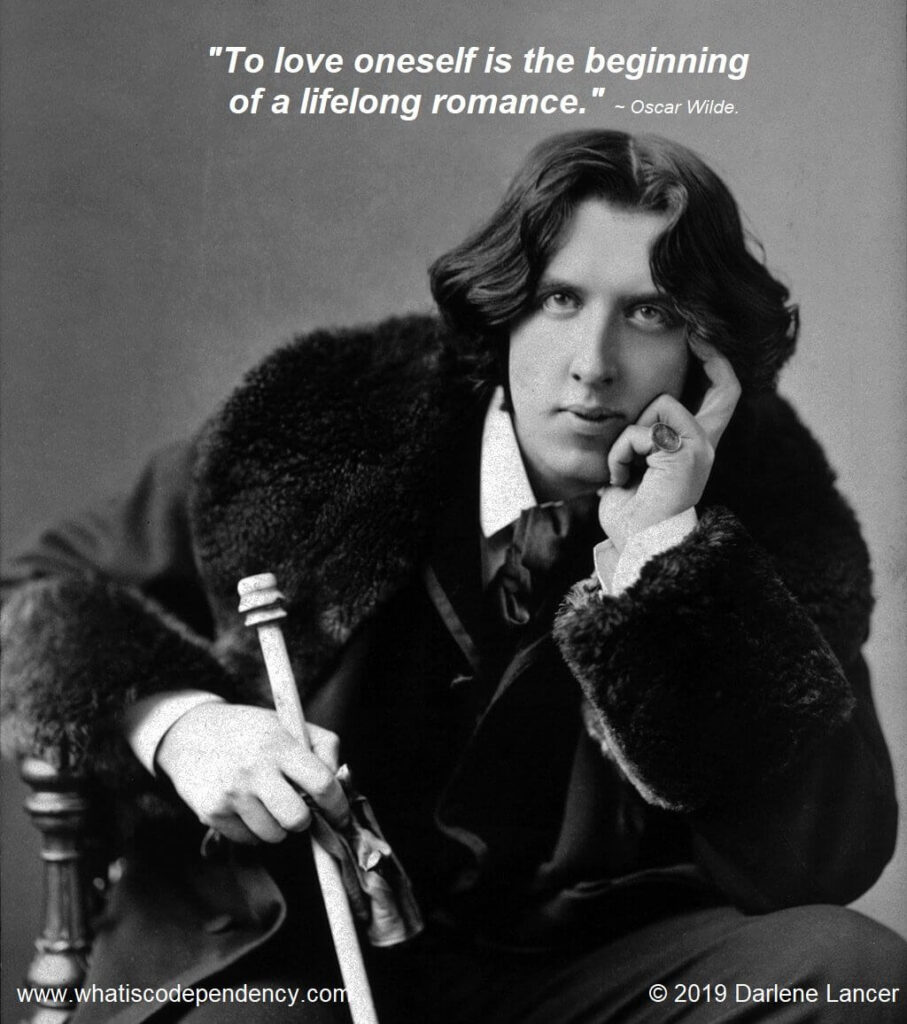 “To love oneself is the beginning of a lifelong romance,” wrote Oscar Wilde. Known for his wit and irony, was Wilde referring to narcissistic love or real self-love and healthy narcissism? There is a difference. Wilde’s use of the word “romance” suggests the former. That’s a key to differentiating the two concepts.
“To love oneself is the beginning of a lifelong romance,” wrote Oscar Wilde. Known for his wit and irony, was Wilde referring to narcissistic love or real self-love and healthy narcissism? There is a difference. Wilde’s use of the word “romance” suggests the former. That’s a key to differentiating the two concepts.
Romantic love is filtered by illusion and idealization. In the romantic phase of relationships, intense feelings are predominantly based on projection and physical pleasure. All is rosy, because we don’t really know the other person or see his or her flaws.
Oscar Wilde’s novel The Picture of Dorian Gray is about narcissism.
How Shame Feels and What Makes it Toxic
 Sprawled on the hallway floor, skirt flying, hitting and kicking, I wrestled with Tina before a crowd of junior high school schoolmates, including a dozen boys from my class. Tina was a gang member who had recently transferred from another school. She and her cohorts had taunted and insulted me all week. She started in again, shoving me at our adjacent lockers. I’d finally had enough, I pushed her back, and we ended up fighting on the floor.
Sprawled on the hallway floor, skirt flying, hitting and kicking, I wrestled with Tina before a crowd of junior high school schoolmates, including a dozen boys from my class. Tina was a gang member who had recently transferred from another school. She and her cohorts had taunted and insulted me all week. She started in again, shoving me at our adjacent lockers. I’d finally had enough, I pushed her back, and we ended up fighting on the floor.
Before actually harming one another, the girls V.P. escorted us to her office. Tina was expelled. I felt relieved that only my modesty was tarnished . . . until I returned home. Then I was mortified to discover a small rip in my panties! My defectiveness, symbolized by that imperfection, had been exposed. This is the essence of shame.
Why You Can Love an Abuser
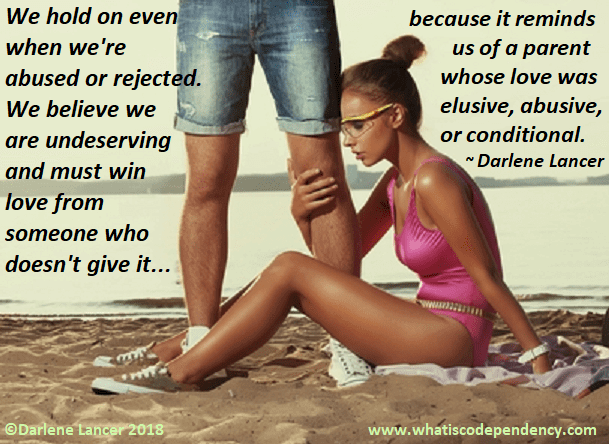 Falling in love happens to us ― usually before we really know our partner. It’s because we’re at the mercy of unconscious forces, commonly called “chemistry.” Don’t judge yourself for loving an abuser or someone who doesn’t treat you with care and respect, because by the time the relationship turns abusive, you’re attached and want to maintain your connection and love. You may have overlooked hints of abuse at the beginning because abusers are good at seduction.
Falling in love happens to us ― usually before we really know our partner. It’s because we’re at the mercy of unconscious forces, commonly called “chemistry.” Don’t judge yourself for loving an abuser or someone who doesn’t treat you with care and respect, because by the time the relationship turns abusive, you’re attached and want to maintain your connection and love. You may have overlooked hints of abuse at the beginning because abusers are good at seduction.
Why You Were Ghosted and What to Do
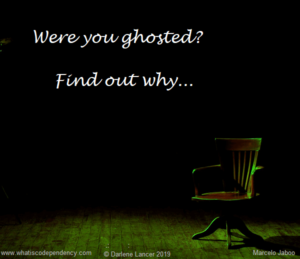 Rejection and breakups are hard enough, but being ghosted can be traumatic. It can leave you with unanswered questions that make it hard to move on. Although ghosting also occurs in friendships, it’s usually associated with dating. More devastating, but less common, is when a spouse disappears after years of marriage. It’s like the sudden death of the person and the marriage. But even the unexplained, unexpected end to a brief romantic relationship can feel like betrayal and shatter your trust in yourself, in love, and in other people.
Rejection and breakups are hard enough, but being ghosted can be traumatic. It can leave you with unanswered questions that make it hard to move on. Although ghosting also occurs in friendships, it’s usually associated with dating. More devastating, but less common, is when a spouse disappears after years of marriage. It’s like the sudden death of the person and the marriage. But even the unexplained, unexpected end to a brief romantic relationship can feel like betrayal and shatter your trust in yourself, in love, and in other people.
Unexpected Trauma from Abuse
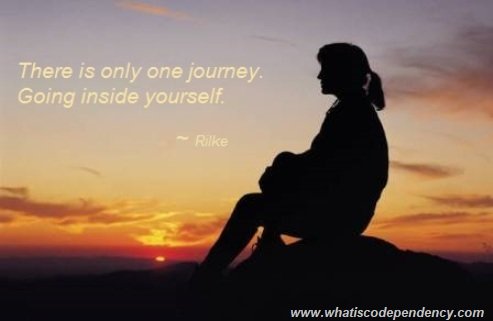 Codependency robs us of a self and self-love. We’ve learned to conceal who we really are, because we grew up pleasing, rebelling against, or withdrawing from dysfunctional parents. This sets us up for trauma. As adults, even if we’re successful in some areas, our emotional life isn’t easy. We’re insecure about our worth and find self-love elusive. Continue reading
Codependency robs us of a self and self-love. We’ve learned to conceal who we really are, because we grew up pleasing, rebelling against, or withdrawing from dysfunctional parents. This sets us up for trauma. As adults, even if we’re successful in some areas, our emotional life isn’t easy. We’re insecure about our worth and find self-love elusive. Continue reading
Spiritual Transformation Through Relationship
 A relationship can be an exciting spiritual path to the unknown. It offers an ever-present opportunity to grow―a path to spiritual transformation and mutual discovery and ultimately the divine. The word spirituality derives from “spiritus,” meaning vitality or breath of life. Like an electric charge, that force awakens our soul. The more we’re aligned with it, the stronger and more alive is our soul. We tap into this power each time we express ourselves authentically.Continue reading
A relationship can be an exciting spiritual path to the unknown. It offers an ever-present opportunity to grow―a path to spiritual transformation and mutual discovery and ultimately the divine. The word spirituality derives from “spiritus,” meaning vitality or breath of life. Like an electric charge, that force awakens our soul. The more we’re aligned with it, the stronger and more alive is our soul. We tap into this power each time we express ourselves authentically.Continue reading
Covert Tactics Manipulators Use to Control and Confuse You
 Many of us don’t recognize manipulators or even realize they’re trying to control and confuse us. We may have an uneasy feeling in our gut that doesn’t match the manipulator’s words or feel trapped into agreeing with a request. Most people react in ways that escalate abuse. Or they play into the hands of the abuser and feel small and guilty, but retreat allows unacceptable behavior. If you had a manipulative parent, it may be harder to recognize it in a partner, because it’s familiar.
Many of us don’t recognize manipulators or even realize they’re trying to control and confuse us. We may have an uneasy feeling in our gut that doesn’t match the manipulator’s words or feel trapped into agreeing with a request. Most people react in ways that escalate abuse. Or they play into the hands of the abuser and feel small and guilty, but retreat allows unacceptable behavior. If you had a manipulative parent, it may be harder to recognize it in a partner, because it’s familiar.
To “know your enemy” is essential in dealing with a manipulator. Spotting their hidden arrows allows you to respond strategically. Understanding what they’re up to empowers you.
What You Should Know about Narcissists, Their Partners, & NPD

Poor Narcissus. The gods sentenced him to a life without human love. He fell in love with his own reflection in a pool of water and died hungering for its response. Narcissism was named for him. Like Narcissus, narcissists only love themselves as reflected in the eyes of others. It’s a common misconception that they love themselves. They actually dislike themselves immensely. Their inflated self-flattery, perfectionism, and arrogance are merely covers for the self-loathing they don’t admit–usually even to themselves. Instead, it’s projected outwards in their disdain for and criticism of others. Continue reading
What is Self-Esteem and How to Raise It?
 Self-esteem is what we think of ourselves. When we raise our self-esteem, we have confidence and self-respect. We’re content with ourselves and our abilities, in who we are and our competence. Self-esteem has significant ramifications for our happiness and enjoyment of life. It affects not only what we think, but also how we feel and behave. It influences every aspect of our lives.
Self-esteem is what we think of ourselves. When we raise our self-esteem, we have confidence and self-respect. We’re content with ourselves and our abilities, in who we are and our competence. Self-esteem has significant ramifications for our happiness and enjoyment of life. It affects not only what we think, but also how we feel and behave. It influences every aspect of our lives.
Why Narcissists Act the Way They Do
 You can enjoy narcissistic symptoms when a narcissist is charming, charismatic, seductive, exciting, and engaging. But they can also act entitled, exploitative, arrogant, aggressive, cold, competitive, selfish, obnoxious, cruel, and vindictive. You can fall in love with their charming side and be destroyed by their dark side. It can be baffling, but it all makes sense when you understand what drives them. That awareness protects you from their games, lies, and manipulation.
You can enjoy narcissistic symptoms when a narcissist is charming, charismatic, seductive, exciting, and engaging. But they can also act entitled, exploitative, arrogant, aggressive, cold, competitive, selfish, obnoxious, cruel, and vindictive. You can fall in love with their charming side and be destroyed by their dark side. It can be baffling, but it all makes sense when you understand what drives them. That awareness protects you from their games, lies, and manipulation.
Narcissists have an impaired, undeveloped self. They think and function differently from other people, because of the way their brain is wired, whether due to nature or nurture.
What is Codependency?
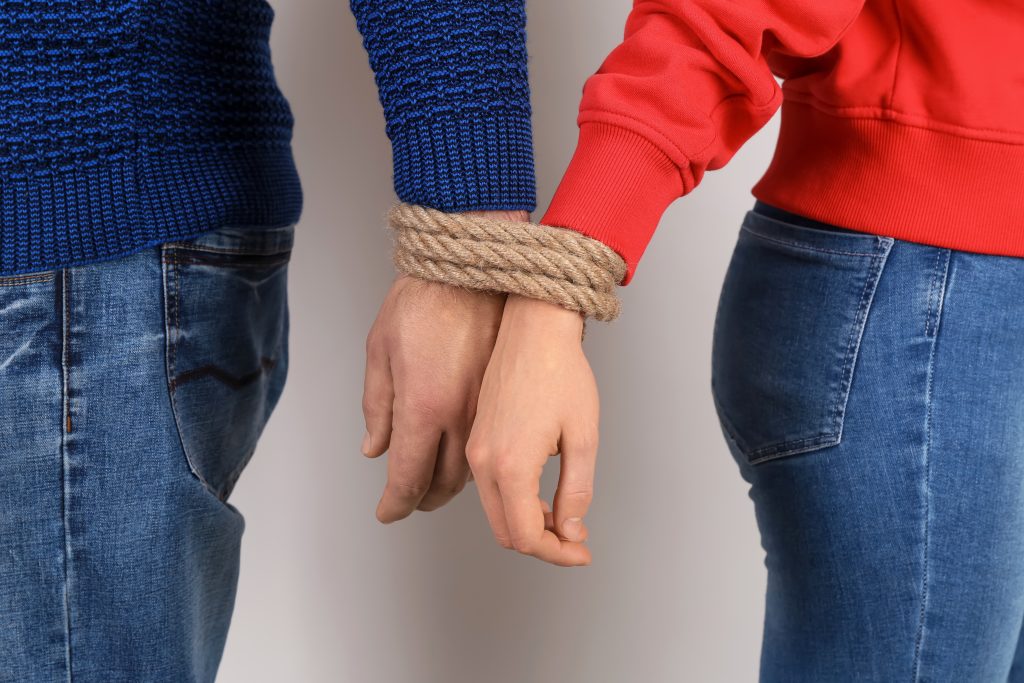
Codependency is sneaky and powerful. You may not be aware that it’s the root cause of your problems. If your thinking and behavior revolve around someone you may be codependent. Codependents tune out internal cues and instead of expressing their own needs and feelings, they react to someone or something external. Addicts are codependent, too. Their lives revolve around their addiction–be it food, work, drugs, or sex.
Need-Fulfillment is the Key to Happiness
 The key to happiness is meeting our needs (need-fulfillment). Although codependents are very good at meeting the needs of other people, many are clueless about their own needs. They have problems identifying, expressing, and fulfilling their needs and wants. They’re usually very attuned to other people and may even anticipate their needs and desires. Over the years, they become used to accommodating others and lose the connection to their own needs and wants.
The key to happiness is meeting our needs (need-fulfillment). Although codependents are very good at meeting the needs of other people, many are clueless about their own needs. They have problems identifying, expressing, and fulfilling their needs and wants. They’re usually very attuned to other people and may even anticipate their needs and desires. Over the years, they become used to accommodating others and lose the connection to their own needs and wants.
Combat Narcissists’ and Abusers’ Primary Weapon: Projection

Projection, in general, and narcissist projection are defense mechanisms commonly used by abusers, including people with narcissistic or borderline personality disorder and addicts. Basically, they say, “It’s not me, it’s you!” When we project, we are defending ourselves against unconscious impulses or traits, either positive or negative, that we’ve denied in ourselves. Instead, we attribute them to others. Our thoughts or feelings about someone or something are too uncomfortable to acknowledge. In our minds, we believe that the thought or emotion originates from that other person. Continue reading
The Danger of a Covert Narcissist
 You may be fooled by a covert narcissist, but they’re every bit as much narcissists as the stereotypical extroverted narcissists. Some narcissists may emphasize one personality trait over others. A person with an outgoing personality might always show off and need to be the center of attention, while another narcissist might be a vindictive bully, an entitled playboy, an imperious authoritarian, or an exacting know-it-all, as articulated by Madonna, “Listen, everyone is entitled to my opinion.”
You may be fooled by a covert narcissist, but they’re every bit as much narcissists as the stereotypical extroverted narcissists. Some narcissists may emphasize one personality trait over others. A person with an outgoing personality might always show off and need to be the center of attention, while another narcissist might be a vindictive bully, an entitled playboy, an imperious authoritarian, or an exacting know-it-all, as articulated by Madonna, “Listen, everyone is entitled to my opinion.”
Why and How Narcissists Play Games
 Narcissists play games. To a narcissist, relationships are considered transactional, like buying and selling. The goal is to get what you want at the lowest price. It’s a self-centered, business mindset. Emotions don’t intrude.
Narcissists play games. To a narcissist, relationships are considered transactional, like buying and selling. The goal is to get what you want at the lowest price. It’s a self-centered, business mindset. Emotions don’t intrude.
In relationships, narcissists focus on their goals. For a male narcissist, that’s usually sex or to have a beautiful woman at his side. A female narcissist may be looking for material gifts, sex, acts of service, and/or an extravagant courtship. It’s important to understand a narcissist’s mind.
They see relationships as a means to get what they want, without concern for the feelings of the other person. Their only concern is what they can get out of it. Continue reading
Beware of the Dark Triad
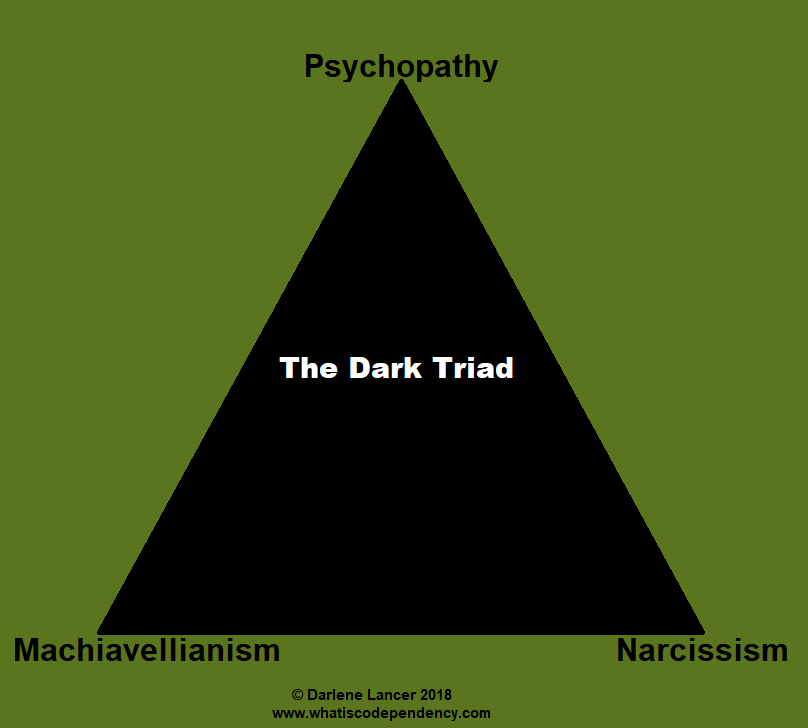 Think of the Dark Triad of Narcissism, Psychopathy, and Machiavellianism as the Bermuda Triangle – it’s perilous to get near it! The traits of all three often overlap and create personality profiles that are damaging and toxic, especially when it comes to intimate relationships, where we let our guard down.
Think of the Dark Triad of Narcissism, Psychopathy, and Machiavellianism as the Bermuda Triangle – it’s perilous to get near it! The traits of all three often overlap and create personality profiles that are damaging and toxic, especially when it comes to intimate relationships, where we let our guard down.
One woman was the subject of identity fraud. Her bank accounts and credit cards were compromised. She regularly spoke to the FBI and suffered extreme anxiety and emotional stress. The authorities were unsuccessful in finding the culprit.
How to Spot a Narcissist
 Narcissists can be beguiling and charismatic. One study showed that their likable veneer was only penetrable after seven meetings. But don’t fall in love with one. Over time you can end up feeling ignored, uncared for, and unimportant. Typically, a narcissist’s criticism, demands, and emotional unavailability increase, while your confidence and self-esteem decrease. Here’s how to spot a narcissist… Continue reading
Narcissists can be beguiling and charismatic. One study showed that their likable veneer was only penetrable after seven meetings. But don’t fall in love with one. Over time you can end up feeling ignored, uncared for, and unimportant. Typically, a narcissist’s criticism, demands, and emotional unavailability increase, while your confidence and self-esteem decrease. Here’s how to spot a narcissist… Continue reading
Love Bombing and Narcissistic Attachment
 Love bombing can feel glorious! The lavish attention and affection seem to answer our prayers. We’ve found Mr. or Ms. Right―our soul mate; unsuspecting that we’ve been targeted by a narcissist. The bomber abruptly changes colors and loses interest, and our dream comes crashing down. Rejection is excruciating, especially at the height of romance. It’s a traumatic shock to our hearts. We feel duped, betrayed, and abandoned.
Love bombing can feel glorious! The lavish attention and affection seem to answer our prayers. We’ve found Mr. or Ms. Right―our soul mate; unsuspecting that we’ve been targeted by a narcissist. The bomber abruptly changes colors and loses interest, and our dream comes crashing down. Rejection is excruciating, especially at the height of romance. It’s a traumatic shock to our hearts. We feel duped, betrayed, and abandoned.
Deprogramming Codependent Beliefs
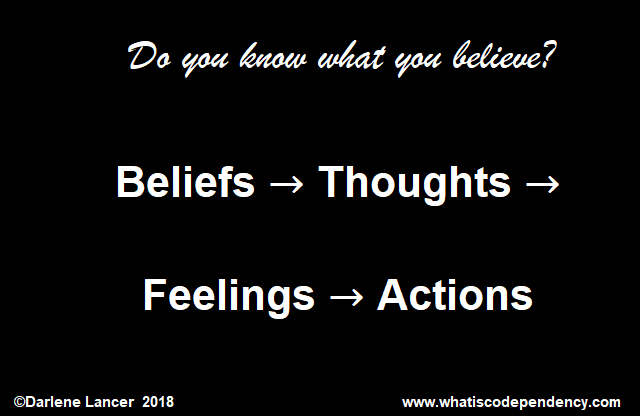 Codependency is based on false, dysfunctional beliefs that are learned from our parents and our environment. Recovery entails changing those beliefs, the most damaging of which is that we’re not worthy of love and respect – that we’re somehow inadequate, inferior, or just not enough. This is internalized shame. To change, we can challenge our beliefs. Learn how.
Codependency is based on false, dysfunctional beliefs that are learned from our parents and our environment. Recovery entails changing those beliefs, the most damaging of which is that we’re not worthy of love and respect – that we’re somehow inadequate, inferior, or just not enough. This is internalized shame. To change, we can challenge our beliefs. Learn how.
Dealing with Toxic Parents
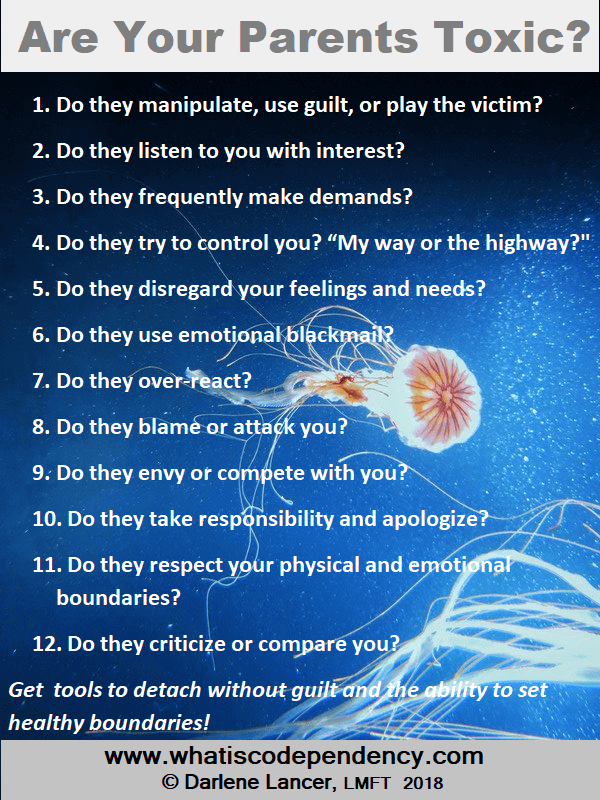 Toxic relationships include relationships with toxic parents. Typically, they do not treat their children with respect as individuals. They won’t compromise, take responsibility for their behavior, or apologize. Often these parents have a mental disorder or a serious addiction.
Toxic relationships include relationships with toxic parents. Typically, they do not treat their children with respect as individuals. They won’t compromise, take responsibility for their behavior, or apologize. Often these parents have a mental disorder or a serious addiction.
We all live with the consequences of poor parenting. However, if our childhoods were traumatic, we carry wounds from abusive or dysfunctional parenting. We may not recognize it as such. It feels familiar and normal. We may be in denial and not realize that we’ve been abused emotionally, particularly if our material needs were met. Unfortunately, when they haven’t healed, toxic parents can re-injure us in ways that make growth and recovery difficult. The first step to protect yourself is awareness, followed by detaching and setting boundaries.
How to Tell if a Narcissist Loves You
 Anyone who’s loved a narcissist wonders, “Does he really love me?” “Does she appreciate me?” They’re torn between their love and their pain, between staying and leaving, but don’t want to do either. Some swear they’re loved; others that they’re not. It’s confusing, because sometimes they experience caring companionship, only to be followed by demeaning behavior. Narcissists claim to love their family and partners, but do they?
Anyone who’s loved a narcissist wonders, “Does he really love me?” “Does she appreciate me?” They’re torn between their love and their pain, between staying and leaving, but don’t want to do either. Some swear they’re loved; others that they’re not. It’s confusing, because sometimes they experience caring companionship, only to be followed by demeaning behavior. Narcissists claim to love their family and partners, but do they?
How to Handle Narcissistic Abuse
 We’re all capable of abuse when we’re frustrated or hurt. We may be guilty of criticizing, judging, withholding, and controlling, but some abusers, including narcissists, take abuse to a different level. Narcissistic Abuse can be physical, mental, emotional, sexual, financial, and/or spiritual. Some types of emotional abuse are not easy to spot, including manipulation. It can include emotional blackmail, using threats and intimidation to exercise control. However confronting and healing from narcissistic abuse is possible.
We’re all capable of abuse when we’re frustrated or hurt. We may be guilty of criticizing, judging, withholding, and controlling, but some abusers, including narcissists, take abuse to a different level. Narcissistic Abuse can be physical, mental, emotional, sexual, financial, and/or spiritual. Some types of emotional abuse are not easy to spot, including manipulation. It can include emotional blackmail, using threats and intimidation to exercise control. However confronting and healing from narcissistic abuse is possible.
Do I Have to Lose Me to Love You?
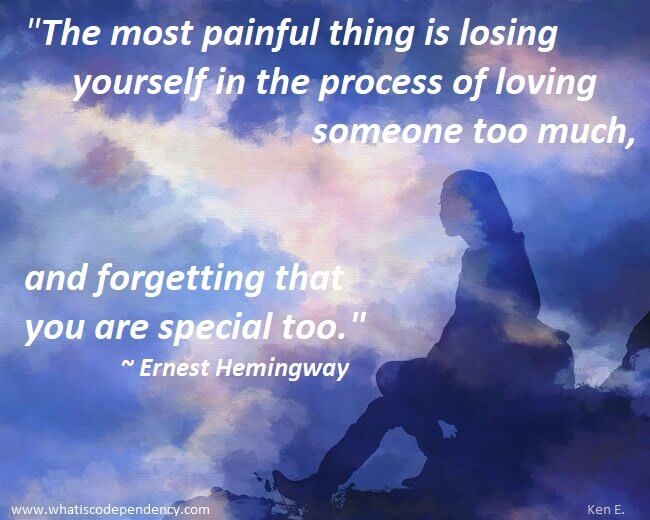 Some of us get so wrapped up in a relationship that we tend to lose ourselves. It happens slowly until it’s too late. We don’t realize that losing our Self is the ultimate cause of despair. When the relationship inevitably ends, it’s devastating, because we are lost. We might seem to do fine on our own, but the struggle to achieve it shows up in our relationships. We lose ourselves gradually in small imperceptible ways.
Some of us get so wrapped up in a relationship that we tend to lose ourselves. It happens slowly until it’s too late. We don’t realize that losing our Self is the ultimate cause of despair. When the relationship inevitably ends, it’s devastating, because we are lost. We might seem to do fine on our own, but the struggle to achieve it shows up in our relationships. We lose ourselves gradually in small imperceptible ways.
Do’s and Don’ts in Confronting Abuse
 Abuse is about having power over someone. Abusers typically want to feel superior and to control and dominate. To them, communication is not about understanding. It’s a win-lose game. They use verbal abuse and/or violence to accomplish this. They’re frequently self-centered, impatient, unreasonable, insensitive, unforgiving, lack empathy, and are often jealous, suspicious, and withholding. Continue reading
Abuse is about having power over someone. Abusers typically want to feel superior and to control and dominate. To them, communication is not about understanding. It’s a win-lose game. They use verbal abuse and/or violence to accomplish this. They’re frequently self-centered, impatient, unreasonable, insensitive, unforgiving, lack empathy, and are often jealous, suspicious, and withholding. Continue reading
5 Red Flags and Blind Spots in Dating a Narcissist
 Narcissists can be beguiling and charismatic. They easily charm codependents. One study showed that narcissists’ likable veneer was only penetrable after seven meetings. I’ve had a number of clients who claimed that the courtship with their narcissistic spouse was wonderful and that abuse only began following the wedding. With greater insight, these clients admitted that there were signs that they’d overlooked. Here’s how to know whether or not you’re dating a narcissist…Continue reading
Narcissists can be beguiling and charismatic. They easily charm codependents. One study showed that narcissists’ likable veneer was only penetrable after seven meetings. I’ve had a number of clients who claimed that the courtship with their narcissistic spouse was wonderful and that abuse only began following the wedding. With greater insight, these clients admitted that there were signs that they’d overlooked. Here’s how to know whether or not you’re dating a narcissist…Continue reading
Gaslighting 101: Signs, Symptoms, and Recovery
 Gaslighting is a malicious and hidden form of emotional and mental abuse, designed to plant seeds of self-doubt and alter your perception of reality. The term comes from the play and later film Gaslight with Ingrid Bergman and Charles Boyer.
Gaslighting is a malicious and hidden form of emotional and mental abuse, designed to plant seeds of self-doubt and alter your perception of reality. The term comes from the play and later film Gaslight with Ingrid Bergman and Charles Boyer.
Gaslighting refers to a deliberate pattern of manipulation calculated to make you trust the perpetrator and doubt your own perceptions or sanity, similar to brainwashing. Like all abuse, it’s based on the need for power, control, or concealment.Continue reading
Narcissus and Echo: The Heartbreak of Relationships with Narcissists
 The poignant myth of Narcissus and Echo crystallizes the problem of relationships with narcissists. They were tragic characters in Ovid’s Metamorphoses. Sadly, both partners feel insufficiently loved but are locked in a painful drama. Yet, the narcissist feels irreproachable and blames his or her partner, who too often readily agrees.
The poignant myth of Narcissus and Echo crystallizes the problem of relationships with narcissists. They were tragic characters in Ovid’s Metamorphoses. Sadly, both partners feel insufficiently loved but are locked in a painful drama. Yet, the narcissist feels irreproachable and blames his or her partner, who too often readily agrees.
Narcissus was a handsome hunter who broke the hearts of many women. Despite their love, he remained aloof and arrogant. Pridefully, he held them in disdain.Continue reading
Daughters of Narcissistic Mothers
 Our mother is our first love. She’s our introduction to life and to ourselves. She’s our lifeline to security. We initially learn about ourselves and our world through interactions with her. We naturally long for her physical and emotional sustenance, her touch, her smile, and her protection. Her empathetic reflection of our feelings, wants, and needs informs us who we are and that we have value. A narcissistic mother who cannot empathize damages her children’s healthy psychological development. Continue reading
Our mother is our first love. She’s our introduction to life and to ourselves. She’s our lifeline to security. We initially learn about ourselves and our world through interactions with her. We naturally long for her physical and emotional sustenance, her touch, her smile, and her protection. Her empathetic reflection of our feelings, wants, and needs informs us who we are and that we have value. A narcissistic mother who cannot empathize damages her children’s healthy psychological development. Continue reading
Trauma of Children of Addicts & Alcoholics
 Living with an addict (including an alcoholic [1]) can feel like living in a war zone. The addict’s personality changes caused by addiction create chaos. Family dynamics are organized around the substance abuser, who acts like a tyrant, denying that drinking or using is a problem while issuing orders and blaming everyone else.
Living with an addict (including an alcoholic [1]) can feel like living in a war zone. The addict’s personality changes caused by addiction create chaos. Family dynamics are organized around the substance abuser, who acts like a tyrant, denying that drinking or using is a problem while issuing orders and blaming everyone else.
To cope and avoid confrontations, typically family members tacitly agree to act as if everything is normal, not make waves, and not mention addiction. They deny what they know, feel, and see.
This all takes a heavy psychological toll, often causing trauma, especially on those most vulnerable, the children. Yet more than half are in denial that they have an addicted parent.Continue reading
5 Life-Changing Habits that Build Self-Esteem
 Our thoughts are powerful – for better or worse. They set off chain reactions that build self-esteem or undermine it. Authority over our mind is the ultimate power. “Mind is everything. What you think you become,” said Buddha. Thoughts affect not only our mental health, relationships, and the ability to achieve our goals, but also our physical health – our digestion, circulation, respiration, immunity, and nervous system. Next are our actions. Change begins in the mind, but is manifested and amplified by our actions. Continue reading
Our thoughts are powerful – for better or worse. They set off chain reactions that build self-esteem or undermine it. Authority over our mind is the ultimate power. “Mind is everything. What you think you become,” said Buddha. Thoughts affect not only our mental health, relationships, and the ability to achieve our goals, but also our physical health – our digestion, circulation, respiration, immunity, and nervous system. Next are our actions. Change begins in the mind, but is manifested and amplified by our actions. Continue reading
Getting Triggered and What You Can Do
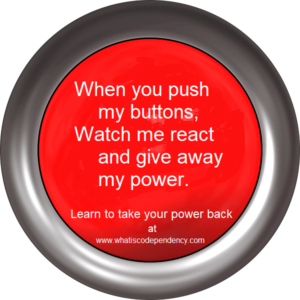 Getting your “buttons” pushed or getting “triggered” can hurt or enrage us. But it’s an opportunity to heal and grow. The more hurts we’ve endured and the weaker our boundaries, the more reactive we are to people and events. Our triggers – our buttons – are our wounds.
Getting your “buttons” pushed or getting “triggered” can hurt or enrage us. But it’s an opportunity to heal and grow. The more hurts we’ve endured and the weaker our boundaries, the more reactive we are to people and events. Our triggers – our buttons – are our wounds.
Codependents are off the charts when it comes to reacting to others’ feelings, needs, problems, opinions, wants, and more. When we react, we permit our insides to be taken over by someone or something outside of us. We’re pulled off center and might start thinking about that person or about what might happen in the future. There’s no filter or boundary. Continue reading
Relationship Killers: Anger and Resentment

Anger and resentment hurt when we don’t get what we want or need. It can escalate to rage when we feel assaulted or threatened by something physical, emotional, or abstract, such as an attack on our reputation. When we react disproportionately to our present circumstance, it’s because we’re really reacting to something in our past event – often from childhood.
Many of us have a lot of anger and for good reason, but we don’t know how to express it effectively.
How to Spot Manipulation
 We all want to get our needs met, but manipulators use underhanded methods. Manipulation is a way to covertly influence someone with indirect, deceptive, or abusive tactics. Manipulation may seem benign or even friendly or flattering as if the person has your highest concern in mind. In reality, it’s to achieve an ulterior motive.
We all want to get our needs met, but manipulators use underhanded methods. Manipulation is a way to covertly influence someone with indirect, deceptive, or abusive tactics. Manipulation may seem benign or even friendly or flattering as if the person has your highest concern in mind. In reality, it’s to achieve an ulterior motive.
Sometimes, it’s veiled hostility. It can be abusive and the objective may purely be power. You may not realize that you’re being intimidated. If you grew up being manipulated, it’s harder to discern what’s going on, because it feels familiar. Continue reading
10 Tips to Spot Emotional Unavailability
 If you’ve ever been in a relationship with someone emotionally unavailable, you know the pain of being unable to get close to the one you love. They’re evasive, make excuses or are just inept in talking about feelings or the relationship. Some use anger, criticism, or activities to create distance. You end up feeling alone, depressed, unimportant, or rejected. More women complain about emotional unavailability than men, yet are unaware that they’re emotionally unavailable, too. Continue reading
If you’ve ever been in a relationship with someone emotionally unavailable, you know the pain of being unable to get close to the one you love. They’re evasive, make excuses or are just inept in talking about feelings or the relationship. Some use anger, criticism, or activities to create distance. You end up feeling alone, depressed, unimportant, or rejected. More women complain about emotional unavailability than men, yet are unaware that they’re emotionally unavailable, too. Continue reading
The Power of Personal Boundaries
 Love won’t last without personal boundaries. It’s easy to understand external boundaries as your bottom line. Think of rules and principles you live by when you say what you will or won’t do or allow.
Love won’t last without personal boundaries. It’s easy to understand external boundaries as your bottom line. Think of rules and principles you live by when you say what you will or won’t do or allow.
If you have difficulty saying no, override your needs to please others, or are bothered by someone who is demanding, controlling, criticizing, pushy, abusive, invasive, pleading, or even smothering you with kindness, it’s your responsibility to speak up.
Recovering from Rejection and Breakups
 Because our nervous system is wired to need others, rejection and recovering from breakups are painful. Loneliness and the need for connection share the evolutionary purpose of survival and reproduction. Ideally, loneliness encourages us to maintain our relationships and reach out to others. Rejection in an intimate relationship especially hurts. It’s particularly difficult in the romantic phase of a relationship when you have unmet hope for the future.
Because our nervous system is wired to need others, rejection and recovering from breakups are painful. Loneliness and the need for connection share the evolutionary purpose of survival and reproduction. Ideally, loneliness encourages us to maintain our relationships and reach out to others. Rejection in an intimate relationship especially hurts. It’s particularly difficult in the romantic phase of a relationship when you have unmet hope for the future.
How to Change Your Attachment Style
 We’re wired for attachment – why babies cry when separated from their mothers. Depending especially upon our mother’s behavior, as well as later experiences and other factors, we develop a style of attaching that affects our behavior in close relationships. (Read how early “Attachment Style Shapes Our Choices“)Continue reading
We’re wired for attachment – why babies cry when separated from their mothers. Depending especially upon our mother’s behavior, as well as later experiences and other factors, we develop a style of attaching that affects our behavior in close relationships. (Read how early “Attachment Style Shapes Our Choices“)Continue reading
Emotional Abuse: Beneath Your Radar?
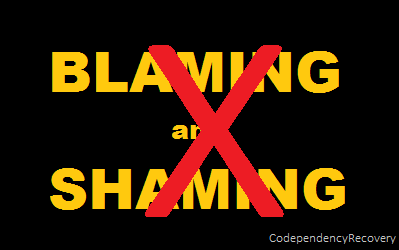 Over 10 million men and women are subjected to domestic violence each year. Many more go unreported. Emotional abuse precedes violence, but is rarely discussed. Unfortunately, many don’t even realize it.
Over 10 million men and women are subjected to domestic violence each year. Many more go unreported. Emotional abuse precedes violence, but is rarely discussed. Unfortunately, many don’t even realize it.
Emotional abuse may be hard to recognize, because it can be subtle, and abusers often blame their victims. Continue reading
Dealing with a Passive-Aggressive Partner
 Passive-aggressive people act passive, but express aggression covertly. They’re basically obstructionist and try to block whatever you want. Their unconscious anger gets transferred onto you, and you become frustrated and furious. Your fury is theirs, while they calmly ask, “Why are you getting so angry?” or blame you for the anger they’re provoking.
Passive-aggressive people act passive, but express aggression covertly. They’re basically obstructionist and try to block whatever you want. Their unconscious anger gets transferred onto you, and you become frustrated and furious. Your fury is theirs, while they calmly ask, “Why are you getting so angry?” or blame you for the anger they’re provoking.
Passive-aggressive partners are generally codependent, and like codependents, suffer from shame and low self-esteem.
Are You a Caregiver or Codependent Caretaker?
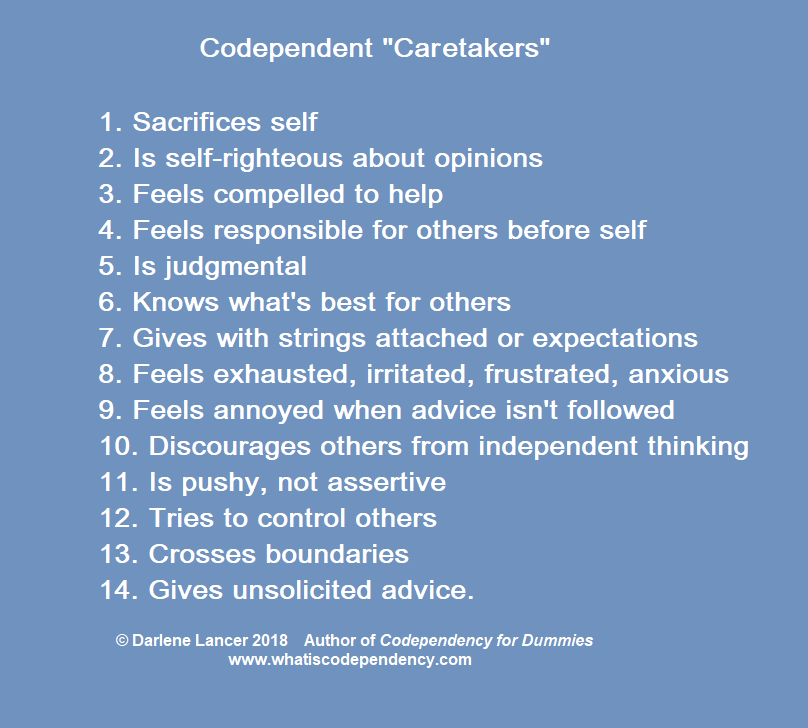 Conventional belief is that we can never love too much, but that isn’t always true. Sometimes, love can blind us so that we deny painful truths. We might believe broken promises and continue to excuse someone’s abuse or rejection. We may empathize with them but not enough with ourselves. If we grew up in a troubled environment, we might confuse our pain with love. Although relationships have disappointments and conflicts, love isn’t supposed to be painful and hurt so much. Are you a caregiver or a codependent caretaker? Continue reading
Conventional belief is that we can never love too much, but that isn’t always true. Sometimes, love can blind us so that we deny painful truths. We might believe broken promises and continue to excuse someone’s abuse or rejection. We may empathize with them but not enough with ourselves. If we grew up in a troubled environment, we might confuse our pain with love. Although relationships have disappointments and conflicts, love isn’t supposed to be painful and hurt so much. Are you a caregiver or a codependent caretaker? Continue reading
Living with an Addict – Alcoholic
 In 2022, 48.7 million people aged 12 or older had a substance use disorder, including 29.5 million using alcohol, 27.2 million using drugs, and 8 million people who used both.
In 2022, 48.7 million people aged 12 or older had a substance use disorder, including 29.5 million using alcohol, 27.2 million using drugs, and 8 million people who used both.
Living with an addict can be a living hell. Unpredictable and dangerous, yet sometimes exciting and romantic. Never knowing when we’ll be blamed or accused. Not being able to dependably plan social events. As the addict becomes more irresponsible, we pick up the slack and do more, often becoming the sole functioning parent or even the sole provider; yet we’re unable to lean on our partner for comfort or support.Continue reading
Are You a People-Pleaser?
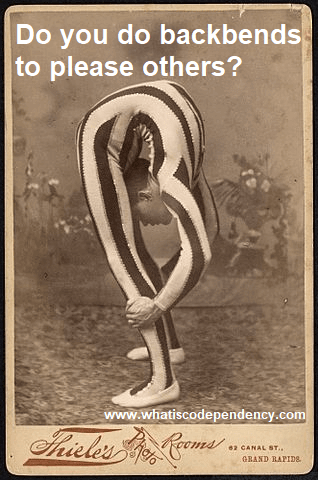 A people-pleaser isn’t just big-hearted or kind to others. Nor are people-pleasers compromising. People-pleasing differs from accommodating someone though we rather not, because we value the relationship and know that compromise is necessary to sustain it. People-pleasers don’t have the luxury of choice. Their behavior has become a lifestyle. It’s compulsive, because they’re unable to say no.
A people-pleaser isn’t just big-hearted or kind to others. Nor are people-pleasers compromising. People-pleasing differs from accommodating someone though we rather not, because we value the relationship and know that compromise is necessary to sustain it. People-pleasers don’t have the luxury of choice. Their behavior has become a lifestyle. It’s compulsive, because they’re unable to say no.
Everyone starts out in life wanting to be safe, loved, and accepted. It’s in our DNA. Some of us figure out that the best way to do this is to put aside what we want or feel and allow someone else’s needs and feelings to take precedence. This works for a while. It feels natural, and there’s less outer conflict, but our inner conflict grows. If we’d like to say no, we feel guilty, and we may feel resentful when we yes. We’re damned if we do and damned if we don’t.
Trapped in an Unhappy Relationship?
 Do you feel trapped in a relationship you can’t leave? Of course, feeling trapped is a state of mind. No one needs consent to leave a relationship. Millions of people stay in unhappy relationships that range from empty to abusive for lots of reasons, but feeling trapped often stems from unconscious fears.
Do you feel trapped in a relationship you can’t leave? Of course, feeling trapped is a state of mind. No one needs consent to leave a relationship. Millions of people stay in unhappy relationships that range from empty to abusive for lots of reasons, but feeling trapped often stems from unconscious fears.
People give many explanations for staying, ranging from caring for young children to caring for a sick mate. One man was too afraid and guilt-ridden to leave his ill wife (11 years his senior). His ambivalence made him so distressed, he died before she did! Money binds couples who believe they can’t afford to separate. Yet, couples with more means may cling to a comfortable lifestyle, while their marriage dissembles into a business arrangement. Continue reading
Symptoms of Codependency
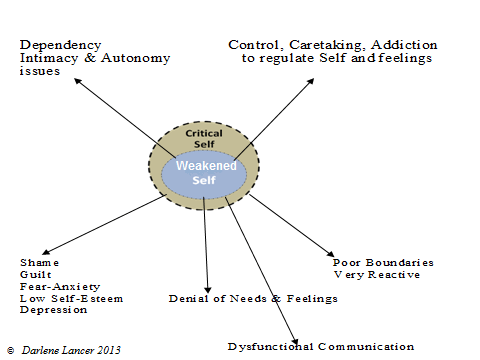 The term codependency has been around for almost four decades. It originally applied to spouses of alcoholics, first called co-alcoholics. Research later revealed that the characteristics of codependents were much more prevalent in the general population than had been imagined. They found that if you were raised in a dysfunctional family or had an ill parent, it’s likely that you’re codependent. Don’t feel discouraged if that includes you. You’re in the majority! So, what are the symptoms of codependency? Continue reading
The term codependency has been around for almost four decades. It originally applied to spouses of alcoholics, first called co-alcoholics. Research later revealed that the characteristics of codependents were much more prevalent in the general population than had been imagined. They found that if you were raised in a dysfunctional family or had an ill parent, it’s likely that you’re codependent. Don’t feel discouraged if that includes you. You’re in the majority! So, what are the symptoms of codependency? Continue reading
Why Can’t I Get Over My Ex?
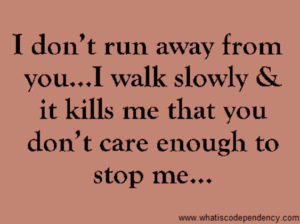 Rejection and breakups are painful, especially for codependents – even in an abusive relationship! It can take us longer to get over a breakup, sometimes years, for even a short relationship. Codependents have difficulty letting go.
Rejection and breakups are painful, especially for codependents – even in an abusive relationship! It can take us longer to get over a breakup, sometimes years, for even a short relationship. Codependents have difficulty letting go.
Breakups affect our self-esteem more than it does for people who are secure and confident. This is because breakups trigger hidden grief and cause irrational guilt, anger, shame, and fear.
What is Emotional Abandonment?
 We may not realize that we’re feeling emotionally abandoned or that we did as a child. We may be unhappy, but can’t put our finger on what it is. People tend to think of abandonment as something physical, like neglect. They also may not realize that loss of physical closeness due to death, divorce, and illness can feel like emotional abandonment. However, emotional abandonment has nothing to do with proximity. It can happen when the other person is lying right beside us – when we can’t connect, and our emotional needs aren’t being met in the relationship.Continue reading
We may not realize that we’re feeling emotionally abandoned or that we did as a child. We may be unhappy, but can’t put our finger on what it is. People tend to think of abandonment as something physical, like neglect. They also may not realize that loss of physical closeness due to death, divorce, and illness can feel like emotional abandonment. However, emotional abandonment has nothing to do with proximity. It can happen when the other person is lying right beside us – when we can’t connect, and our emotional needs aren’t being met in the relationship.Continue reading
Codependency Relationship Problems
 Everyone laughs when I tell them that I wrote Codependency for Dummies. But codependency in relationships is no laughing matter. It causes serious pain and affects the majority of Americans, both in and out of relationships. I know. I spent decades recovering.
Everyone laughs when I tell them that I wrote Codependency for Dummies. But codependency in relationships is no laughing matter. It causes serious pain and affects the majority of Americans, both in and out of relationships. I know. I spent decades recovering.
There are all types of codependents, including caretakers, addicts, pleasers, and workaholics, to name a few. They all have one thing in common: They’ve lost the connection to their core. Their thoughts and behavior revolve around someone or something external, whether it’s a person or an addiction.
The Dance of Intimacy
 The relationship duet is the dance of intimacy all couples do. One partner moves in, the other backs-up. Partners may reverse roles, but always maintain a certain space between them. The unspoken agreement is that the Pursuer chase the Distancer forever, but never catch-up, and that the Distancer keep running, but never really get away.
The relationship duet is the dance of intimacy all couples do. One partner moves in, the other backs-up. Partners may reverse roles, but always maintain a certain space between them. The unspoken agreement is that the Pursuer chase the Distancer forever, but never catch-up, and that the Distancer keep running, but never really get away.
They’re negotiating the emotional space between them. We all have needs for both autonomy and intimacy – independence and dependency, yet simultaneously fear both being abandoned (acted by the Pursuer), and being too close (acted by the Distancer). Thus, we have the dilemma of intimacy: How can we be close enough to feel secure and safe, without feeling threatened by too much closeness?
Profile of a Narcissist Attractor
 Often a partner of a narcissist is a narcissist attractor, but may not realize it until they’ve attracted more than one narcissist. They may have a narcissist in their family of origin, but not always, and not all children of narcissists end up with one. Not all partners of narcissists were raised in unhappy families. People who grew up loving and trusting their parents are also susceptible because they expect others to be loving and trustworthy. Thus, they are less guarded and naive to narcissistic manipulative tactics.
Often a partner of a narcissist is a narcissist attractor, but may not realize it until they’ve attracted more than one narcissist. They may have a narcissist in their family of origin, but not always, and not all children of narcissists end up with one. Not all partners of narcissists were raised in unhappy families. People who grew up loving and trusting their parents are also susceptible because they expect others to be loving and trustworthy. Thus, they are less guarded and naive to narcissistic manipulative tactics.
Similarly, it’s untrue that narcissists look for weak, vulnerable partners.
Continue reading
Self-Love and Healing
 Self-love and healing are challenging, because we’re tempted to look outside ourselves for something or someone to take away our pain. We often flee from pain through distractions, relationships, addictions, or substances, seeking external solutions rather than addressing our inner struggles. Modern life, particularly in urban settings, disconnects us from our natural rhythms. The fast pace and demands of our culture, constant connectivity, and instant gratification overwhelm our biological makeup and detrimentally affect our emotional and physical health. This lifestyle can further distance us from true healing, exacerbating self-neglect and pain.
Self-love and healing are challenging, because we’re tempted to look outside ourselves for something or someone to take away our pain. We often flee from pain through distractions, relationships, addictions, or substances, seeking external solutions rather than addressing our inner struggles. Modern life, particularly in urban settings, disconnects us from our natural rhythms. The fast pace and demands of our culture, constant connectivity, and instant gratification overwhelm our biological makeup and detrimentally affect our emotional and physical health. This lifestyle can further distance us from true healing, exacerbating self-neglect and pain.
What Is Generational Trauma – Mother Wounds
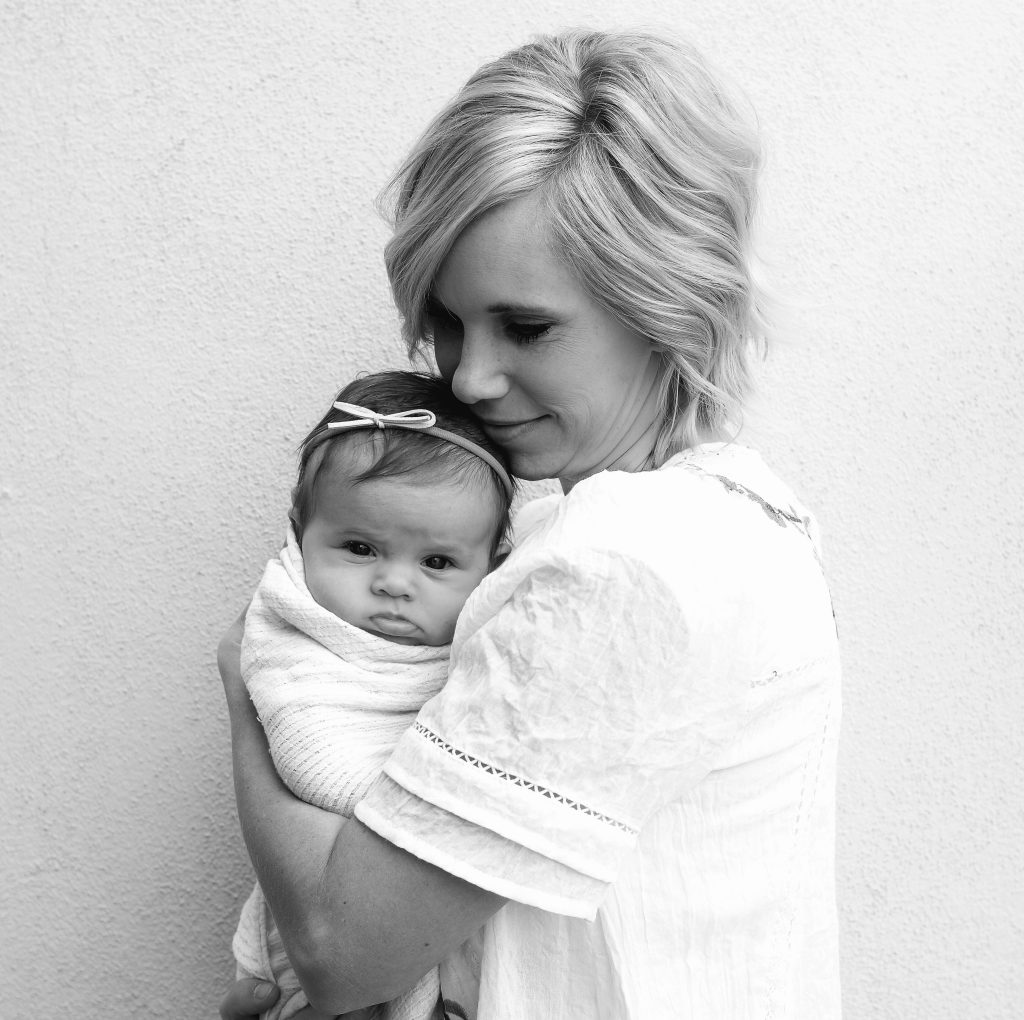 Generational trauma is a form of trauma passed down to subsequent generations through environmental factors such as psychological transference and attachment behavior according to attachment theory. The psychological impact of a traumatic event, such as historical mistreatment, cultural dislocation, physical or emotional abuse, a natural disaster, or poverty, is passed down from one generation to the next, where individuals who did not directly experience the trauma still exhibit symptoms of it due to the experiences of their ancestors or parents.
Generational trauma is a form of trauma passed down to subsequent generations through environmental factors such as psychological transference and attachment behavior according to attachment theory. The psychological impact of a traumatic event, such as historical mistreatment, cultural dislocation, physical or emotional abuse, a natural disaster, or poverty, is passed down from one generation to the next, where individuals who did not directly experience the trauma still exhibit symptoms of it due to the experiences of their ancestors or parents.
In essence, the effects of trauma ripple through a family lineage, impacting subsequent generations even if they weren’t present during the original traumatic event.
Parental communication about the event and the family dynamics and functioning appear to be particularly important in trauma transmission, which can be passed on through learned behaviors and coping mechanisms.
Growth and Healing in Recovery
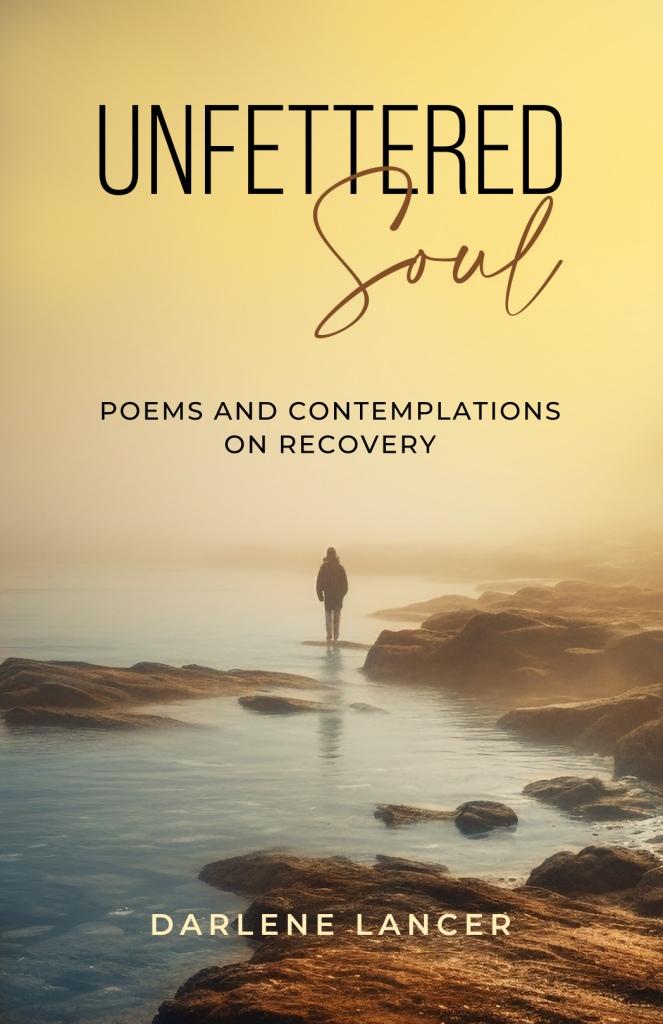
Healing is not linear or categorizable but is an obscure odyssey of the soul that meanders, stagnates, and has ups and downs. It warps time, intertwining our past and present, perspectives, relationships, and emotional struggles. For me, writing has been a gratifying and powerful healing tool along my journey. I decided to publish poems I’ve written and lessons I’ve learned in a new book, Unfettered Soul: Poems and Contemplations on Recovery.
This heartfelt collection contains poems along with beautiful photos contributed by nine other poets. They explore our grief, triumphs, and revelations along our path to self-love, healing, and transformation. Cry, laugh, exclaim hurray, and aha as you follow our inquiry into soul reclamation. We delve into the multifaceted nature of the psyche, offering sensitive wisdom into personal growth.
For me, crafting a poem is a journey that uncovers, clarifies, and releases complex feelings and experiences. As a child, I began reading and writing poetry, which has since become a gratifying and powerful tool for healing and self-discovery. This introspective process often starts with a reflection on a feeling, a thought, or an observation in nature, sometimes unfolding as a metaphor that mirrors inchoate ideas or emotions.
The Role of Faith in Recovery

In childhood, I lost trust in my parents and traditional religion and have since struggled with understanding and embracing the complexities of faith. Faith implies reliance on something beyond our ordinary consciousness. People generally associate faith with religion and adherence to religious texts and doctrines. I often envied those with a devout religious faith, as it can provide great succor in times of distress.
Although interpretations vary, major religions define God through their texts. Theistic religions share themes of viewing God as an omnipotent, omniscient, benevolent creator.
Healing In Relationships
 Even before we enter the world, our brains and hormones are wired for connection. Our first relationship begins in our mother’s womb, where we recognize her voice and respond to her moods through hormones and stress responses. Later, her smell and touch become familiar. Affection and responsive communication are necessary for developing our brains and bodies.
Even before we enter the world, our brains and hormones are wired for connection. Our first relationship begins in our mother’s womb, where we recognize her voice and respond to her moods through hormones and stress responses. Later, her smell and touch become familiar. Affection and responsive communication are necessary for developing our brains and bodies.
Early interactions with our parents shape our self-image and template for love and relationships. Our patterns of relating and reacting, attachment style, are often repeated in adult relationships—romantic and otherwise.
A secure attachment in an intimate relationship can empower, enliven, and uplift us. It celebrates our successes and comforts us in defeat and sorrow. However, despite the potential benefits many of us have had painful romantic relationships, and some have never truly known a safe one.
Depression and Despair

When reality doesn’t match our desires and childhood coping mechanisms fail us, life presents us with painful lessons that may lead to depression. The patterns we developed in response to unmet childhood needs can strain our relationships. If we were overly indulged or our disappointment was unconsoled in childhood, we become easily discouraged or more willful as adults. Both responses hinder our ability to adapt to reality. Stubborn self-will can prevent us from finding workable solutions.
Maturity allows us to shed our illusions, accept reality, and take proactive steps to meet our needs.
Hidden Truth About Codependent Relationships
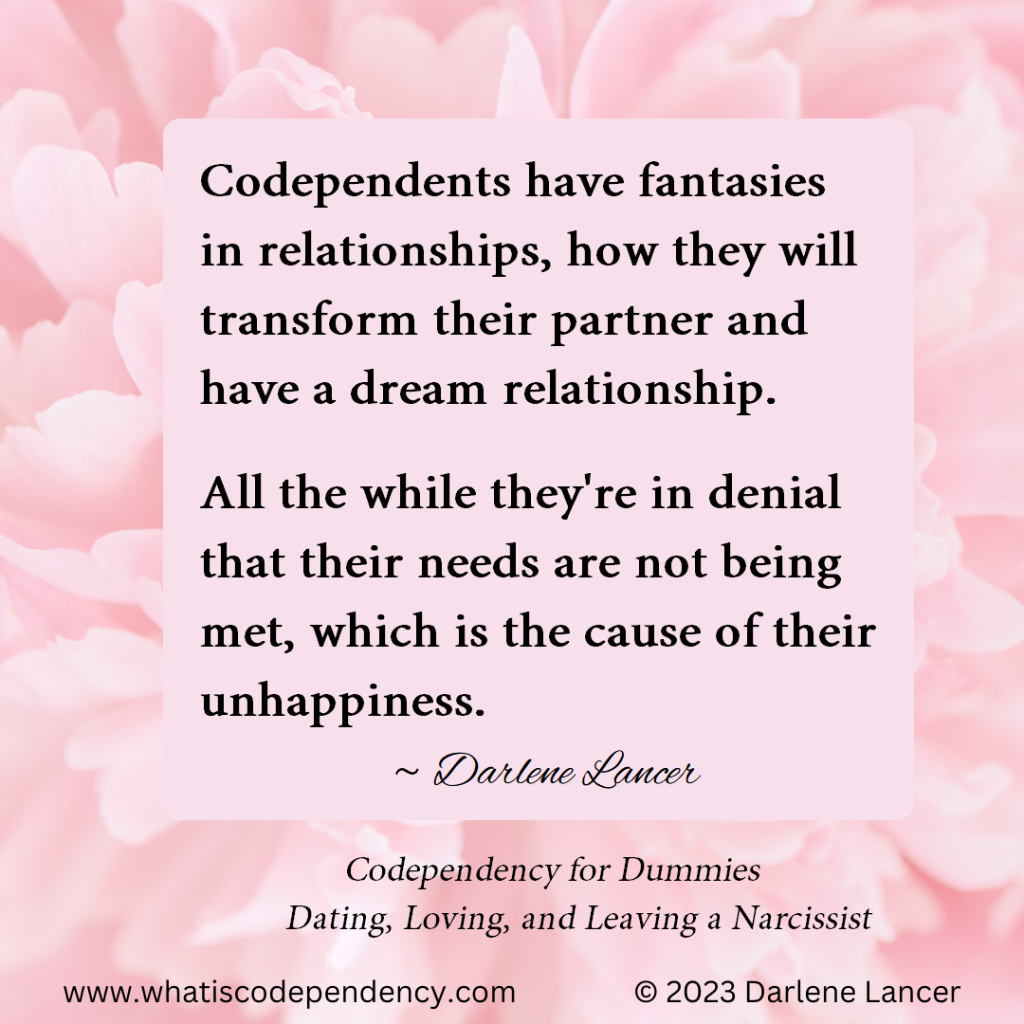 There’s a saying, “The ending is in the beginning.” Problems in codependent relationships start with codependents’ low self-esteem, lack of boundaries, and their idealization of love – that it will solve their deeper problems, including shame, which generates beliefs such as: “If I’m loved, I’m lovable,” and “If I’m needed, I won’t be abandoned and lonely.”
There’s a saying, “The ending is in the beginning.” Problems in codependent relationships start with codependents’ low self-esteem, lack of boundaries, and their idealization of love – that it will solve their deeper problems, including shame, which generates beliefs such as: “If I’m loved, I’m lovable,” and “If I’m needed, I won’t be abandoned and lonely.”
Codependents have fantasies of how wonderful their relationship will be, “if only …” their partner would transform (with their help.)
Toxic shame beginning in childhood due to dysfunctional parenting is the source of codependency symptoms and behaviors. But most people are unaware of these feelings. Some may have frequent or occasional, fleeting thoughts of being inadequate, inferior in some way, unlikeable, or unlovable.


